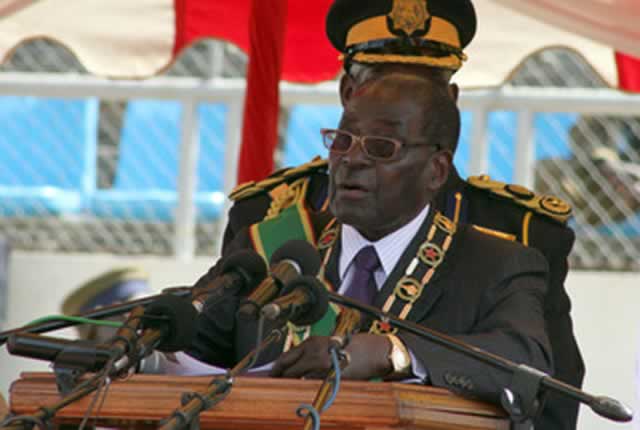ZDF: The making of a people’s force


President Mugabe, who is Commander-in-Chief of the Zimbabwe Defence Forces, delivers a speech at the National Sports Stadium during celebrations to mark the 34th anniversary of the ZDF yesterday
Address by His Excellency the President and Commander-in-Chief of the Zimbabwe Defence Forces, Cde R. G. Mugabe on the 34th anniversary of the Zimbabwe Defence Forces at the National Sports Stadium yesterday.
IT gives me great pleasure to be part of this anniversary celebration of the Zimbabwe Defence Forces. Thus, today, we celebrate the Force’s 34 years of existence, illustrious performance and defence excellence.
Today’s celebration gives us an opportunity to reflect the force’s past operations as well as coming up with relevant future plans.
This year’s celebrations are being held under the theme, “The Genesis of the Zimbabwe Defence Forces in Defence of National Sovereignty, Social and Economic Development”. A befitting theme, indeed, which reflects the origin, role, achievements, aims, plans of the National Defence Forces.
The genesis of the Zimbabwe Defence Forces sprang from the varied forms of oppression perpetrated by white colonialists on the black majority.
The white settlers were quick to displace blacks, forcing them to occupy unproductive land, which was unsuitable for either cropping or grazing. In addition, blacks were forced to radically reduce their cattle, a symbol of their wealth.
As if that was not enough, the indigenous people were forced to be white farmers’ labourers.
Such intense discontent, born out of the suffocating oppression by white settlers, culminated in the emergence of early trade unionism.
Led by the likes of Benjamin Burombo, trade unionism gave rise to a national consciousness, which grew and matured into political parties of the 1950s and 1960s.
An emerging middle class grew out of the black, who, defying the odds, had received enough education to break out of the peasant-labour cauldron.
These provided the requisite leadership and organisational skills, channelling the grievances of the black majority towards a coherent national political consciousness. The formation of the Southern Rhodesia African National Congress, the National Democratic Party, Zapu and Zanu, was largely attributed to these groups of courageous indigenous intellectuals.
When UDI was declared in 1965, it completely shut out the political space for the blacks in the Southern Rhodesia colony.
The increasingly dire circumstances of the blacks, both in overcrowded reserves and in towns, mines and on the farms, had by this time radicalised them. The 1965 UDI became the turning point, the time to call to arms, the genesis of the Zimbabwe Defence Forces.
The adoption of the armed struggle by the nationalists, was indeed the only language the white man would understand. The liberation war would be waged, mainly in the mode of the Chinese Revolution that provided the invaluable model of a “people’s war”.
This was a war which demanded, firstly, the political education of the masses, and the subsequent establishment of symbiotic relationship between the guerrillas and the masses, the “fish and water” principle. A very strict code of conduct was to be closely followed by the revolutionary guerilla cadres, and it was also to determine the way cadres would relate with the masses.
By the time nationalists launched the armed struggle, the international community, particularly the Soviet Union, China and the newly independent states of the Third World, had become seized with plight of those people still under the yoke of colonialism.
The UN General Assembly was used to pass resolutions that totally condemn the practice of colonialism, but instead supported the UN Charter’s call for the self-determination of all people under colonialism.
Closer to home, the founding fathers of the OAU, chief among them Kwame Nkrumah, Julius Nyerere, Sekou Toure, had declared at their very first summit in 1963, that Africa would not be free until all its people were free. These courageous pan-Africanists influenced the OAU to establish the African Liberation Committee (ALC), specifically for the attainment of this goal.
The liberation war received moral, diplomatic, material support and training mainly from Algeria, Egypt, Ghana, Cuba, China and the Soviet Union.
The early days of the military campaign were predictably deficient in military leadership, material and, most importantly, ideological grounding. However, time eventually corrected these weaknesses.
Recruiting during those early days was also very difficult.
The Rhodesian policing was brutally effective. The cowed populace had not been politicised enough to withstand the storm of the armed struggle. Generally, the early cadres were regarded as wanting to do the “impossible”, and since the white men was regarded as “invincible”, fighting him was considered hopeless, futile, and something akin to “kurova shumba nembama”.
The very high toll of the guerilla captives was an indication of the insecurity of the operating environment the early cadres faced when they entered Rhodesia for operations. Despite these setbacks, the Chinhoyi, Hwange, Sipolilo (Chipuriro) battles were the true manifestations of Mbuya Nehanda’s “Mapfupa Achamuka” prophecy. The gallant cadres of such battles formed a firm foundation to “The Genesis of the ZDF”.
The early battles, which inspired many young men and women to join the armed struggle, fired the warning shots of the escalation of the struggle.
The early seventies saw the opening the North East Zone, specifically in Centenary, where guerillas’ attacked Altena Farm. This was indeed a wake-up call to the Rhodesians that their temporary victories at Hwange, Chinhoyi and Chipuriro had only been but just the beginning of a much protracted and wider guerilla campaign.
Overwhelmed by the escalating conflict, the British and the Americans crafted mechanisms to halt the onslaught, in an effort to protect their beleaguered kith and kin in Rhodesia.
Although there had been temporary suspension of the conflict through Détente in 1974-75, the Frelimo victory in Mozambique in 1975 opened floodgates for thousands of young cadres, who abandoned schools to join the liberation war.
The resumption of the liberation war in 1976 witnessed the swelling of new recruits into Mozambique and Zambia, leading to the opening of Manica, Gaza, Northern and Southern fronts among others.
As the war became unbearable for the Rhodesians, they were left with no choice but to capitulate at Lancaster House, London, in 1979.
On attaining Independence, the cadres of the armed struggle formed the nucleus of the new army. Some joined the army, police, municipality, parastatals and government. While some opted to go back to school others were demobilised.
Those who joined the army formed the bedrock of what we now have as the Zimbabwe Defence Forces, whose 34th anniversary we are commemorating today. Since Independence, the country has celebrated the Zimbabwe Defence Forces Day during the second week of August every year.
Having been established from such difficult and humble beginnings, the Zimbabwe Defence Forces gradually evolved to become the solid force that it is now.
They have scored several successes, especially in the provision of human resources not only for Zimbabwe, but for other countries in the region.
The Zimbabwe Staff College has over the years played host to officers from the region for both its junior and senior staff training programmes.
The Air Wing of the Zimbabwe Defence Forces went a step further and assisted its South African, Malawian and Tanzanian counterparts in the training of pilots and technicians. A team of Zimbabwe Defence Forces officers is currently attached to the Namibian Defence Forces, assisting with military training programmes.
Such exchanges vividly demonstrate the cordial relations that exist between the Zimbabwe Defence Forces and their regional counterparts and the level of confidence these countries have in the professionalism and expertise of our forces.
On the regional front, the Zimbabwe Defence Forces continue to make significant contributions towards the development of the Sadc and African Union Standby Forces.
In this regard, the Zimbabwe Defence Forces have played a leading role in contributing intellectual, material and military capacities.
Our Defence Forces have participated in regional exercises as part of the build-up and operationalisation of the Standby Force. In June 2014, the Zimbabwe Defence Forces successfully co-hosted a riverine exercise code-named “Exercise Nyami-Nyami” with Botswana and Zambia Defence Forces.
The aim of the exercise was to test the inter-operability of regional Special Forces in water bodies like Lake Kariba. A similar exercise will be taking place in Angola and the Democratic Republic of Congo in 2015.
On the other hand, the first African Union field level training exercise dubbed “Amani Africa 11”, will take place in Lesotho in April 2015. Exercise Africa Amani 11 will bring together forces from five African regions and the Zimbabwe Defence Forces will provide the Force Commander for the exercise.
The Zimbabwe Defence Forces have faced some challenges, largely induced by heinous illegal sanctions imposed by the European Union and the United States of America.
Despite the sanctions, the Zimbabwe Defence Forces have remained resolute in guaranteeing the defence and security of our country. Working in conjunction with the Zimbabwe Republic Police, the forces continue to safeguard our country’s borders as well as curbing smuggling, poaching and cattle rustling.
As per its established tradition, the ZDF also provides assistance to local communities, especially when national disasters occur. The ZDF, through the Air Force of Zimbabwe, has changed the lives of the Murongwe community in Chief Chiswiti’s area, where schoolchildren, who learned in grass-thatched classrooms, and teachers living in rain-soaked thatched rondavels, now have modern classrooms and living quarters.
The classrooms will soon be connected to the Internet to facilitate e-learning.
While the responsibility of transforming the country’s economy lies with all sectors of the economy, the Zimbabwe Defence Forces continue to be seized with the provision of food security in the country. Operation Maguta, a project which started in 2000, and has since been expanded to greater levels, producing substantial amounts of maize, and significant wheat production in a Joint Venture Project with the Chinese at Hunyani Estate in Chinhoyi.
The Zimbabwe Defence Forces is also contributing to the Zimbabwe Agenda for Sustainable Socio-Economic Transformation (Zim-Asset) through this and several other commercial projects that will, in the medium to long term, contribute significantly to the country’s Gross Domestic Product.
May I conclude by applauding the Zimbabwe Defence Forces for their important role in keeping the country safe.
The level of commitment to national security is indeed second to none. Allow me also to express my sincere gratitude to all who have converged here today to share the celebration with the Zimbabwe Defence Forces.
I thank you.







Comments